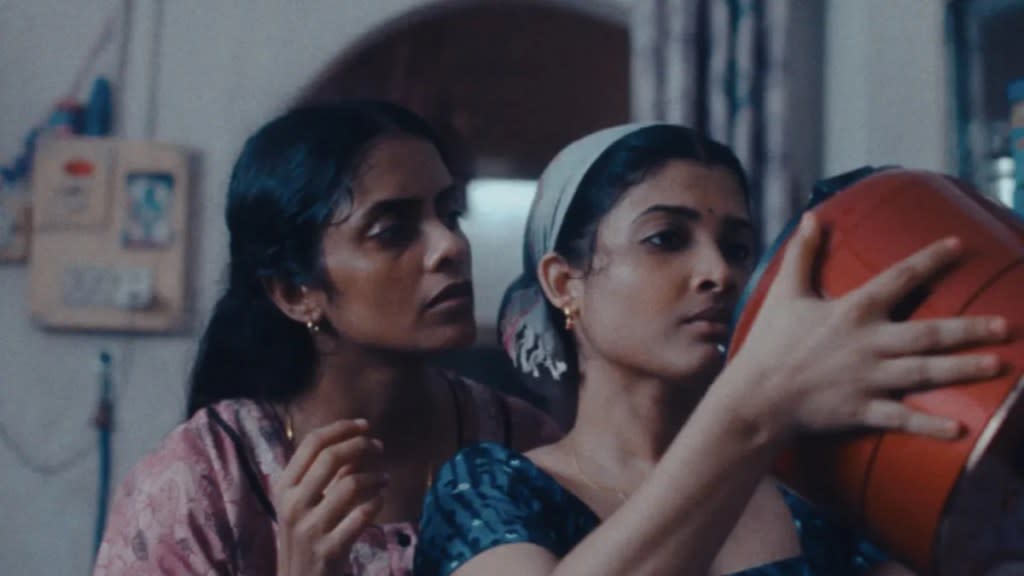‘All We Imagine as Light’ Review: An Intimate Peek Into the Grind of Big-City Mumbai Life

The heat, hustle, glory and grind of modern-day Mumbai give way to something all the more mysterious and ever so beguiling in Payal Kapadia’s “All We Imagine as Light,” an expansive and intimate feature that has itself shined some late-breaking glory on this year’s Cannes Film Festival. As the first Indian filmmaker to compete for the Palme d’Or in three decades, Kapadia claimed a measure of victory well before this year’s edition; by exploring social precarity through soft tones of romantic yearning, her film seems likely to claim a prize before Cannes closes.
Indeed, jury president Greta Gerwig might even notice certain thematic similarities to her signature “Frances Ha,” as Kapadia’s film also traces the siren’s call of an indifferent metropolis just as likely to chew you up as to make your dreams come true. With a population of more than 20 million and counting, Mumbai has no shortage of such dreamers, a fact partly alluded to by the film’s title — which imagines what’s behind the seas of apartment windows that consume the city skyline — and by a documentary prologue that skirts a similar sea of people, sharing voices from the crowd.
Following her Cannes-acclaimed doc “A Night of Knowing Nothing,” Kapadia’s narrative debut goes granular soon enough, welcoming us into the dingy high-rise flat shared by nurses Prabha (Kani Kusruti) and Anu (Divya Prabha). Both come from the countryside, only now wouldn’t live anywhere else; both work at the same maternity ward, sharing birth control on the sly; and both suffer for acute longing, though here the circumstances diverge.
In many ways, younger Anu has it easier, as the object of her affection is very much in sight, if ever out of reach. You see, Anu is Hindu and her crush Shiz (Hridhu Haroon) is Muslim. Under Modi’s Hindutva, never those twains shall meet. At least not in private, in any case, because the city’s night markets and bazaars offer stages where the frustrated pair may at least hide in plain view.
Prabha’s issues are more metaphysical, however, linked to an arranged marriage to a chap who fled the country shortly after their nuptials. He left the nurse with little more proof of matrimony than the occasional overseas care-package and the societal expectation that she snuff out new sparks of romance.
And dammit, the woman has suitors, including a doctor colleague who treats his own case of urban ennui by writing poetry. In one of the film’s greatest highs, Prabha reads one of those poems to herself late one night, sitting before her open window as the heat swelters and the power turns off. Lit by the cityscape behind her, the lovesick nurse makes her inner life tactile and her soul universal. She feels as if she’s one in 22 million, and, in that precise moment, like she’s the only damn person in the world.
While Kapadia and Sofia Coppola explore different sides of the socioeconomic spectrum, both share a similar interest in interiority, and in the ways female characters create intimate worlds to shield against unforgiving externalities. This vision of Mumbai can certainly be harsh, most clearly exemplified by a third colleague: nurse Parvaty (Chhaya Kadam), now getting evicted so that developers may turn her home of 20 years into a luxury condo. (The new building’s sales pitch: “Class is for the privileged.” Well, thanks.)
With few opportunities for recourse, Parvaty makes the decision all urbanites dread, setting the stage for a second act that finds the two younger nurses helping their older colleague return to her seaside village. Through this change in scenery arrives a delicate change in tone, one that reframes the film’s title with emphasis on a different word.
Once freed from the iron grip of realism, “All We Imagine as Light” begins to offer its leads what the city never could. We will reveal nothing further, because Kapadia herself parcels out these reveals at a deliberate pace, offering metaphysical hints with the gentleness of a sea breeze.
That gentleness spans out across the film, informing and underscoring both sides. If Kapadia never hides the harsher elements of urban life, she also does not accentuate them or cast them in a miserablist glow. Taking place almost entirely at night, the film’s Mumbai first-half swings to a jazzy piano score, finding squalor and grandeur as two sides of the same coin.
Setting the second act under the daytime sun, Kapadia keeps things equally lush, playing into the promise that sends so many millions to any global metropolis. It also leads us to the mantra we repeat to gird us through the daily grind once there. “You have to believe the illusion,” says a disembodied voice in a mid-film documentary reset. “Otherwise you’ll go mad.”
The post ‘All We Imagine as Light’ Review: An Intimate Peek Into the Grind of Big-City Mumbai Life appeared first on TheWrap.

 Yahoo News
Yahoo News 
